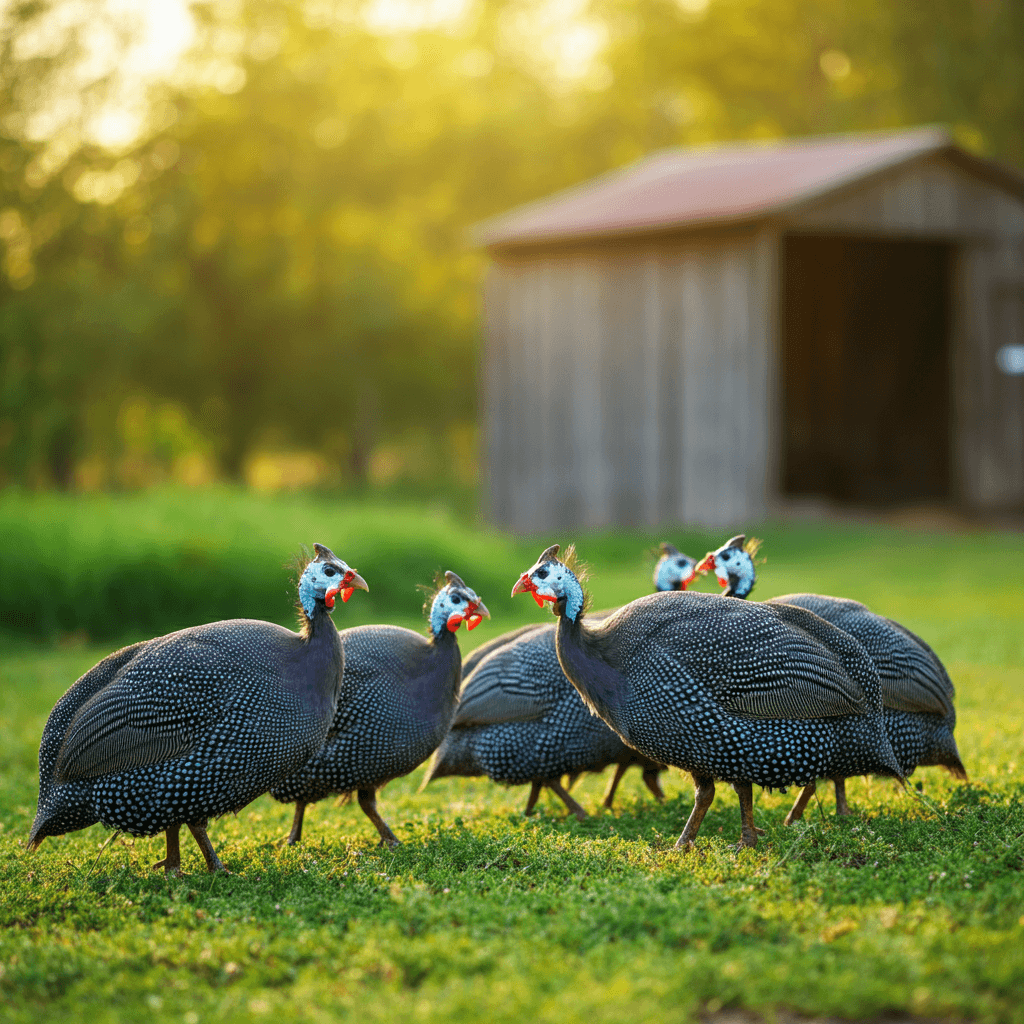Guinea fowl might not be the first poultry that comes to mind when considering backyard farming, but these quirky birds offer some incredible benefits for your homestead. Whether you want to keep pests under control, enjoy fresh eggs, or protect your property, guinea fowl are a sustainable and fascinating addition to your farm.
This article explores the 7 key reasons to raise them, especially if you’re interested in natural tick control, low-maintenance livestock, and boosting your sustainable homesteading practices.
Are Guinea Fowl Worth Raising? Here’s Why
Guinea fowl are an excellent choice for beginner and seasoned homesteaders alike. These resourceful birds can handle pest control, reduce your reliance on chemical solutions, and even contribute to your farm’s food supply.
Featured Snippet
What are the benefits of raising guinea fowl?
Raising them on your homestead offers benefits including natural tick control, low-maintenance care, egg and meat production, property protection, and weed management, making them a sustainable addition to any farm.
Keep reading to learn why guinea fowl may be the perfect choice for your homestead.
1. Say Goodbye to Pests
One of the biggest advantages of raising guinea fowl is their reputation as natural pest control specialists. These birds are voracious foragers, consuming insects like ticks, beetles, and even small snakes. If you’re tired of battling ticks or chiggers on your property, guinea fowl provide an eco-friendly solution.
- Fun fact: A flock of guinea fowl can cover large areas daily in search of pests, offering unmatched protection for your yard and garden.
Not only will you save on chemical pest repellents, but you’ll also reduce the risk of pest-borne illnesses like Lyme disease.
2. Low-Maintenance Livestock for Busy Homesteaders
Guinea fowl are considered low-maintenance poultry, making them ideal for beginners or those with limited time. These independent birds thrive on free-range foraging and require minimal feeding as they rely on insects for 90% of their diet.
What do you need to provide for guinea fowl?
- Basic housing for protection at night.
- Clean water and supplemental grains (especially in winter).
Unlike chickens, they are hardy and rarely fall prey to illness, making them a worry-free addition to your farm.
3. Enjoy Unique Eggs
While not as prolific as chickens, guinea fowl lay delicious, nutrient-rich eggs. Their eggs are slightly smaller but boast a rich, creamy flavor that stands out in recipes.
- Seasonal egg-laying ensures you’ll enjoy fresh eggs during spring and summer.
- Hard shells make guinea fowl eggs easy to store for longer periods.
4. Guinea Fowl as a Meat Source
Guinea fowl meat is lean and flavorful, often described as a cross between chicken and game meat. It’s lower in fat and calories, making it a healthy protein option.
If you’re focused on sustainable homesteading, adding them to your property ensures a reliable food source without much extra effort.
5. Built-In Security for Your Homestead
Did you know guinea fowl are often called the “watchdogs” of the bird world? These birds are highly alert and vocal, making them excellent at detecting predators or intruders.
- Their loud calls will alert you to potential threats like foxes, raccoons, or even unfamiliar visitors.
- When needed, they have been known to gang up on small predators, defending themselves and other farm animals.
For added peace of mind, allow them to roam freely, as they thrive in open and active environments.
6. Cost-Effective and Eco-Friendly Fertilizer
Guinea fowl droppings are a valuable resource for fertilizing your soil. Similar to chickens, they leave nutrient-rich manure wherever they forage, helping improve soil quality naturally.
- Collect their droppings to enrich compost piles or spread it directly into your garden for healthier plants.
- Reduce your reliance on chemical fertilizers while improving sustainability on your farm.
7. Effective Weed Management
Unlike chickens, they rarely damage crops or gardens. Instead, they focus on pulling up weeds, offering an effortless way to manage unwanted growth.
- Great for protecting flower beds and vegetable patches.
- Keeps gardens neat without chemical weed killers.
How to Get Started
Beginner-Friendly Tips
- Start small: Begin with a small flock of 5-10 guinea fowl to gauge how they integrate into your homestead.
- Provide safe shelter: Offer a predator-proof coop for roosting, as guinea fowl prefer returning to a safe home at night.
- Manage loud calls: While vocalizing is part of their natural behavior, placing their coop away from living spaces can help minimize noise impact.
Cost Breakdown
- Guinea fowl chicks (keets): $4-$8 per bird.
- Housing and feed (if needed): $100-$200 initial investment.
- Monthly feed costs: $10-$20, depending on free-range availability.
With their low upkeep and strong rewards, they provide excellent returns for any homesteader.
Mistakes to Avoid
- Overcrowding your space: they need plenty of room to roam. A good rule of thumb is 2-3 acres for a full flock.
- Ignoring early training: If you don’t train them to return to their coop at night, they may choose to roost in unsafe locations.
- Underestimating their calls: Their vocal nature is something to account for before adding them to your property.
Frequently Asked Questions
Can guinea fowl live with chickens?
Yes, they are usually get along with chickens if raised together. However, keep guinea males and roosters apart during mating season to avoid conflicts.
Do guinea fowl need a coop?
While they prefer to roam, they still need a predator-proof shelter for roosting and nesting.
How many guinea fowl should I start with?
A small flock of 5-10 is ideal for starting out. They prefer to live in groups, and a smaller number makes them easier to manage.
Are guinea fowl noisy?
Yes, they are known for their loud calls, especially when they sense danger. Their noise can be reduced by housing them away from living areas.
Do guinea fowl fly away?
they can fly short distances, but if trained to return to their coop, they are unlikely to stray far.
Why Guinea Fowl Are the Perfect Homestead Addition
they offer unmatched benefits for any homestead. From their natural pest control abilities to their role as efficient farmyard protectors, these birds are worth considering for anyone interested in sustainable homesteading.
With their independent nature and low-maintenance needs, they are ideal for both beginners and seasoned farmers.
Want to learn more about sustainable homesteading? Browse our blog for more insights or leave your questions in the comments below—we’d love to help you get started!





Today, I went to the beach with my kids. I found a sea shell and gave it to my 4 year old daughter and said “You can hear the ocean if you put this to your ear.” She put the shell to her ear and screamed. There was a hermit crab inside and it pinched her ear. She never wants to go back! LoL I know this is totally off topic but I had to tell someone!